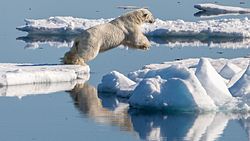| International Polar Bear Day | |
|---|---|
 | |
| Date | February 27 |
| Next time | 27 February 2026 |
| Frequency | Annual |
International Polar Bear Day is an annual event celebrated every February 27, [1] [2] to coincide with the time period when polar bear mothers and cubs are sleeping in their dens, and to raise awareness about the conservation status of the polar bear.
